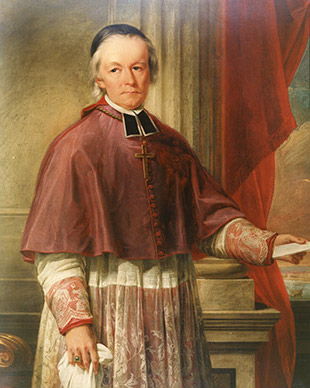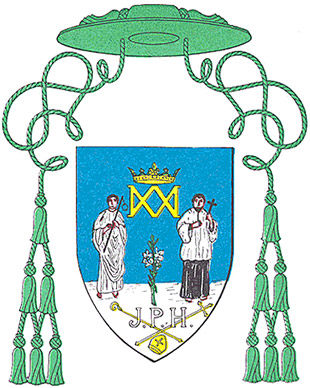

When the Diocese of Montreal was created in 1836, Jean-Jacques Lartigue became its first titular bishop after long and painful difficulties caused by the stormy relations his Sulpician brothers had with him. He had thorough knowledge of the diocese that was entrusted to him, because he had acted as auxiliary bishop and vicar general suffragan of the Bishop of Quebec City, Bishop Plessis, for the district of Montreal since 1820. He is remembered for his interest in education and the wisdom he showed during the political turmoil of 1837-1838.
From birth to the mission to London (1777 - 1820)
Jean-Jacques Lartigue was born in Montreal on June 20, 1777. He was the only son of a French physician, Jacques Lartigue, who immigrated to New France in 1757, and a Canadian mother, Marie-Charlotte Cherrier, from Saint-Denis sur le Richelieu. Through his mother, Jean-Jacques Lartigue was related to three great families of Montreal’s upper class — the Cherrier, Viger and Papineau families — who played an important role in the community, especially during the Rebellion of 1837-1838.
Auxiliary bishop and vicar general suffragan of the Bishop of Quebec City for the district of Montreal (1821 - 1836)
During this 10-month stay in Europe (August 14, 1819-June 14, 1820), Jean-Jacques Lartigue was informed of his appointment as auxiliary bishop and vicar general, suffragan of the Bishop of Quebec City for the district of Montreal. One must understand that it was an appointment for the same vast diocese of Quebec City and that the civil term “district of Montreal” was used because it was not yet a new “diocese.”
Bishop of Montreal (1836 - 1840)
On May 13, 1836, Gregory XVI signed the bull of erection of the new diocese and the writ proposing Jean-Jacques Lartigue for the see of Montreal. Faced with the fait accompli, London, not being consulted beforehand, accepted the new bishop.
In the middle of political turmoil
With everything well in place, however, a difficult political period began. One can say that the last years of Bishop Lartigue’s episcopate were among the most difficult of his life. They coincided with the crisis that shook Lower Canada: the 1837-1838 Rebellions and their consequences. A confrontation was brewing between the Patriots and the British government in place. On July 25, 1837, in his cathedral, the Bishop of Montreal warned the faithful of his diocese against any revolutionary action.
The final word
One final word. It has long been a widespread opinion that Bishop Lartigue had excommunicated some leaders of the rebellion. Often challenged about this act to amend or rescind it, the Quebec bishops published, on March 27, 1987, under the signature of their president, Jean-Marie Fortier, then Archbishop of Sherbrooke, a document entitled [translation] “150th Anniversary of the Rebellion of 1837.” Archbishop Fortier wrote, [translation] “The offenders were not excommunicated or subjected to any ecclesiastical censure whatsoever.”
